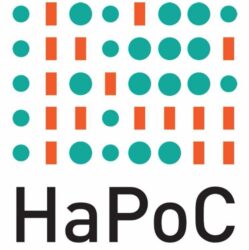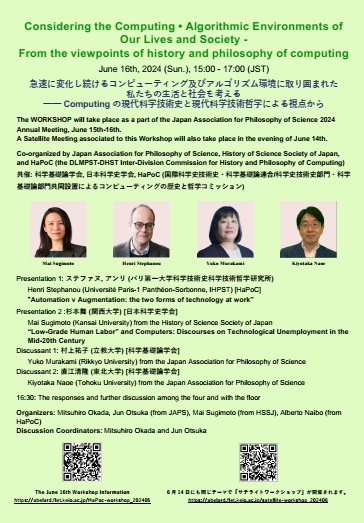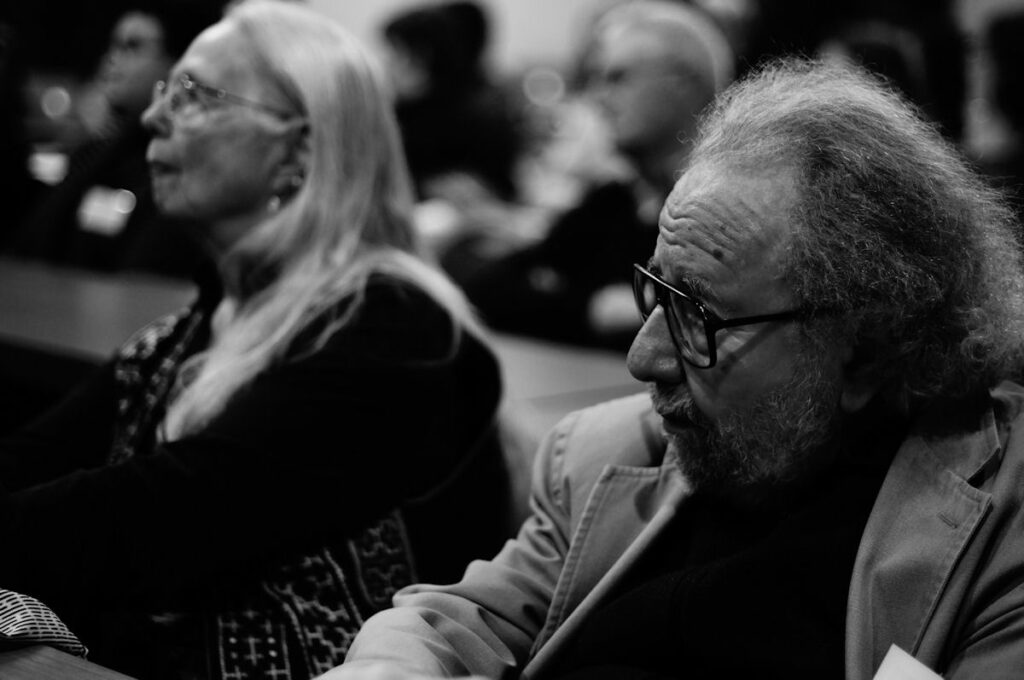The Commission for the History and Philosophy of Computing (HaPoC), as part of the Division of Logic, Methodology and Philosophy of Science and Technology (DLMPST) makes a call for submissions of proposals for symposia to take place at the next CLMPST 2023 in Buenos Aires (Argentina).
List of topics of interest for the HaPoC commission (not limited to):
- Historical and philosophical perspectives on computing knowledge, objects, and practices
- Social, cultural, and pedagogical aspects of computing
- Computing and the human sciences
- Epistemological and ethical dimensions of computing
- Impact of computing technologies
- Proposals by South American scholars or focusing on South American computational practices are especially encouraged.
Submissions should be made following the instructions below. We recommend that interested participants get in touch with the HaPoC Commission as soon as possible, and no later than November 15th 2022. All questions about the commission should be directed to info@hapoc.org.
Important information
Symposia are groups of talks on a common theme. Each symposium consists of four to twelve papers.
In EasyChair – https://easychair.org/conferences/?conf=clmpst2023 – please make a submission for (a) the symposium as a whole; and (b) each paper in the symposium (so, for example, for a four-paper symposium, you should make a total of five submissions).
(a) For the symposium as a whole, please provide an abstract with a general description of the format and the topic of the proposed symposium and its significance (up to 500 words), and suggest a symposium chair. Indicate to which congress section you submit the symposium (tick the appropriate box). After the abstract, please list the titles of the talks in the order they should appear at the conference. Please add the acronym “HaPoC” followed by the acronym for the symposium at the beginning of the title of the symposium (e.g., HaPoC-: ). The acronym will be used by the Programme Committee to keep the individual submissions in a proposal together during reviewing and when creating the conference programme.
(b) For each paper within a symposium, please submit a 500-word abstract (including references). Indicate to which congress section the symposium belongs (tick the appropriate box). Please add the acronym “HaPoC” followed by the acronym of the symposium at the beginning of the title of the talk (HaPoC-<Symposium acronym>: <Title of the individual talk>). The acronym will be used by the Programme Committee to keep the individual submissions in a proposal together during reviewing and when creating the conference program.
Note to symposium organisers: papers intended to be presented as parts of a symposium must be submitted by their respective authors. Symposium organisers should contact all symposium speakers in advance and make sure that they submit their abstracts by the submission deadline of 15 December 2022.
The symposium description is submitted by the symposium organiser by the same deadline. Please make sure that all parts of the submission are prepared for anonymous review and submitted to the same congress section (the same box is ticked in all of them). When submitting a symposium proposal, the EasyChair requires you to take the role of a “speaker“. This is for formal reasons only, and in no way precludes you from submitting a paper of your own (to that same symposium, to a different symposium, or a contributed paper). In this case, you will appear as a “speaker“ on 2 submissions, one of which must be the symposium proposal.
The allocated time for each symposium paper is 30 minutes. For instance, a symposium with 4 speakers is a 2 hour session (4 x 30 minutes). Note that if a symposium consists of more than 4 speakers, it might be split into two sessions due to coffee breaks in the programme.
Rules for multiple presentations
(a) Every corresponding author is allowed to submit only one individual or symposium paper as a “speaker”. (Organising a symposium does not count as being a “speaker”, despite the labelling in EasyChair.)
(b) Authors are permitted to be listed as non-corresponding co-authors of additional papers.
(c) The corresponding author of each paper as well as the organiser of a symposium must be registered as a participant at the Congress and present the paper in Buenos Aires.
All questions about submissions should be directed to the Congress Secretaries, Prof. Federico Pailos and Prof. Luis Urtubey, at secretariosclmpst2023@gmail.com
Important dates:
December 15, 2022 Deadline for symposia submissions
March 2023 Notifications of acceptance
March 2023 Congress registration opens
April 30, 2023 Deadline for early bird registrations
July 1, 2023 No more refunds for registration cancellations
July 24-29, 2023 17th CLMPST, University of Buenos Aires, Buenos Aires


